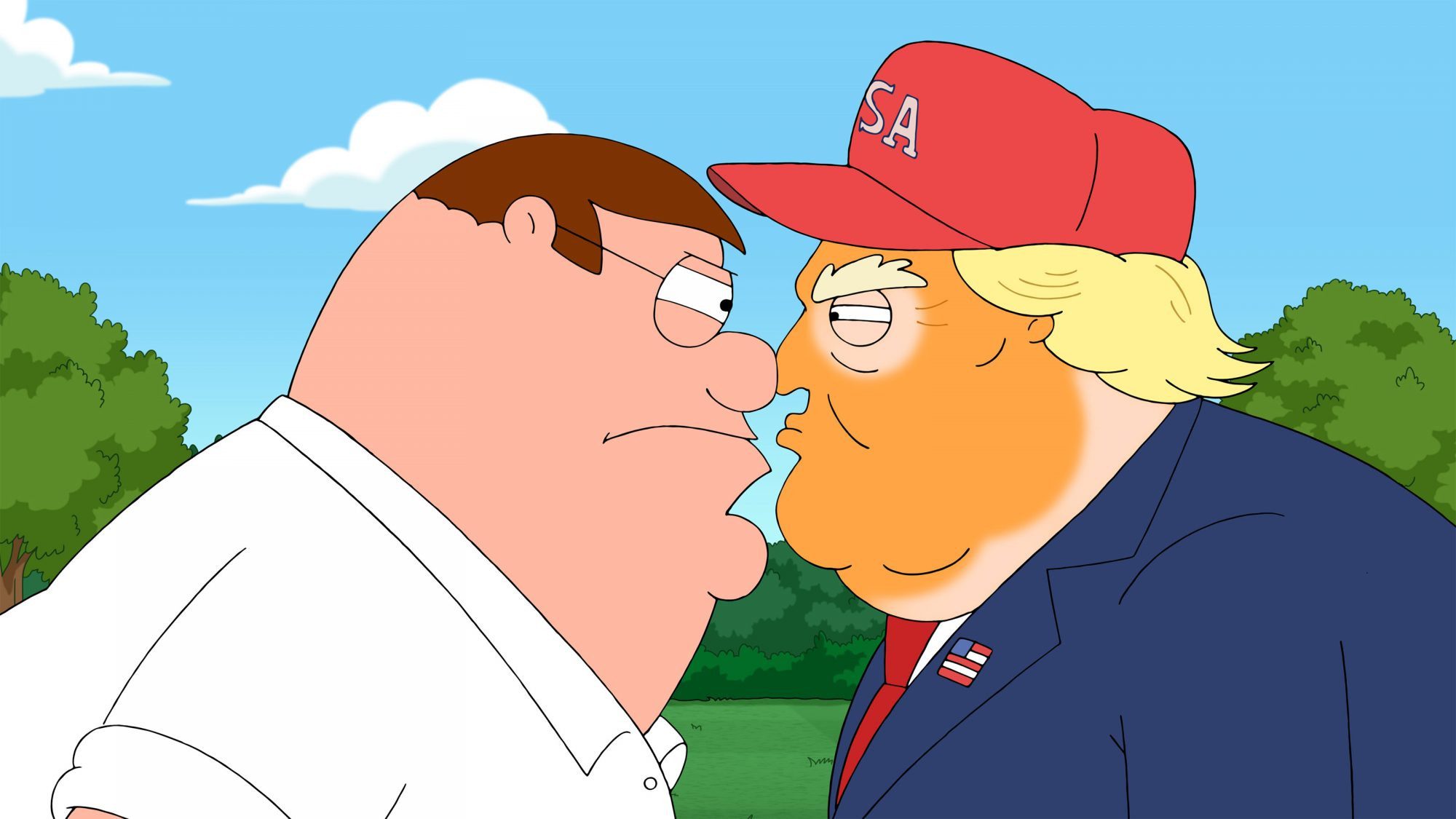Family Guy, known for its no-holds-barred humor, once fearlessly targeted everyone and everything. No group was safe from its irreverent jokes, and this unapologetic attitude was a core part of its appeal. However, in recent seasons, a noticeable shift has occurred. The show seems less confident, less willing to push boundaries, and almost resentful of its own comedic identity. This change is particularly evident in episodes tackling political themes, most notably in the “Trump Guy” episode.
As someone from a minority group often lampooned by Family Guy, I understand the show’s comedic contract. While some jokes might miss the mark or feel insensitive, the expectation is that everyone is fair game. However, the issue isn’t about whether Family Guy can joke about sensitive topics, but how it’s doing it now. The show’s recent approach, especially when it comes to political satire and episodes like “Trump Guy,” reveals a concerning trend of defensiveness and a dilution of its comedic bite.
The shift became glaringly apparent in Season 17’s “Trump Guy.” This episode, which sees the Griffin family visiting the White House to meet Donald Trump, was brimming with potential. Imagine the comedic goldmine of Family Guy tackling the Trump presidency! Yet, instead of seizing this opportunity for sharp, incisive satire, the episode largely fumbles. What could have been a home run of political parody devolves into a rather pedestrian chicken fight and an awkward, self-justifying monologue.
 Family Guy characters in a scene.
Family Guy characters in a scene.
The episode culminates in a bizarre moment where Trump bizarrely compares Family Guy’s lampooning of Bob’s Burgers to his own administration’s failings, including racism, discrimination, and migrant caging. Peter’s response, essentially defending Family Guy by claiming they are “just a cartoon” while Trump is the President, feels weak and defensive. This comparison, seemingly pulled from thin air, highlights the episode’s central flaw: a desperate need to justify its own existence and comedic choices.
It begs the question: who exactly was accusing Family Guy of being as damaging as Trump? It’s a straw man argument, a deflection from any real critique. The Family Guy of its early, edgy days wouldn’t have bothered with such trivial self-defense. But the modern iteration dedicates a two-part episode to this flimsy premise, squandering a golden opportunity for genuine political satire and instead using the time to pathetically defend its own right to exist. Is Family Guy even trying to be provocative anymore? Why the sudden guilt?
 Black and white image of Peter Griffin talking to Donald Trump in the Oval Office.
Black and white image of Peter Griffin talking to Donald Trump in the Oval Office.
“I can be insulting sometimes, I admit it. But so what?” Peter weakly asks Trump in the episode. This line unintentionally encapsulates the show’s current identity crisis. If only Family Guy still believed in that sentiment. And the self-deprecating jab at Bob’s Burgers as some kind of low point only adds to the sense of a show lost in its own anxieties.
The problem with “Trump Guy” isn’t just this specific episode; it represents a broader issue plaguing modern Family Guy. The show frequently retreats into a defensive posture, preemptively addressing criticisms that may not even exist. This self-consciousness dulls the sharp wit that once defined Family Guy and consumes valuable screentime in episodes that already struggle with pacing. The “Trump Guy” episode serves as a stark example of how Family Guy’s attempts at political commentary, specifically involving figures like Trump, are hampered by this newfound hesitancy.
This trend extends beyond political satire and permeates other areas where Family Guy once fearlessly treaded. Consider the show’s handling of transgender representation in recent seasons. While seemingly attempting to be more sensitive, the results are often equally problematic, albeit in a different way. Instead of bold, boundary-pushing humor, we get episodes that feel like clumsy attempts at social commentary, ultimately missing the mark.
 Image of Peter Griffin in drag, wearing a dress and wig.
Image of Peter Griffin in drag, wearing a dress and wig.
Being a Family Guy fan has always been a pact: you accept the punches along with the laughs. As a member of a minority group often targeted by the show’s humor, I understand this dynamic. Critiquing the show for transphobia or any other -ism is valid, but it must be within the context of what Family Guy has always been. The issue now is not that Family Guy is crossing the line too often, but that it seems afraid to even approach it.
Episodes like “Trans Fat,” where Peter is mistakenly assumed to be transgender and undergoes gender confirmation surgery, had immense comedic potential. Yet, Family Guy opted for tame “Peter is a woman” jokes, completely missing the opportunity to explore the nuances and complexities of transgender identity. The episode culminates in Ida lecturing Peter about the struggles of trans people, a preachy and tone-deaf attempt at a moral lesson that feels utterly out of place in Family Guy.
 Animated scene from Family Guy episode "Trans Fat" featuring Peter and Ida.
Animated scene from Family Guy episode "Trans Fat" featuring Peter and Ida.
This moralizing trend, exemplified in the “Trump Guy” and “Trans Fat” episodes, rarely works for Family Guy. In “Trans Fat,” it awkwardly equates the “pros and cons” of being transgender and implies that suffering is a prerequisite for happiness and acceptance. It feels like the show is trying to absolve itself of past offenses, using Ida as a mouthpiece for its own clumsy attempt at confession. It’s a cisgender perspective on the transgender experience, focusing on broad struggles and vague concepts of “selfish” successes.
Similarly, the “Bri-Da” storyline, where Brian dates Ida, feels like another attempt at self-forgiveness. Brian, who once reacted with extreme disgust upon learning Ida was transgender, is now in a relationship with her. This arc could have explored character development and nuanced representation, but instead, Ida remains a punchline, a prop to demonstrate Brian’s (and Family Guy’s) supposed growth. She endures more jokes at her expense, serves as a symbol of Brian’s “changed” perspective, and is ultimately discarded when the storyline runs its course.
 Scene from Family Guy episode "Bri-Da" showing Brian and Ida in a romantic setting.
Scene from Family Guy episode "Bri-Da" showing Brian and Ida in a romantic setting.
Even the episode “The Movement,” tackling Colin Kaepernick and kneeling protests, suffers from the same lack of commitment. Peter’s accidental kneeling, initially used for comedic effect, devolves into a bizarre Black Panther parody and a hollow apology for “pretending” to be woke. The episode avoids any genuine engagement with the issues of racism and protest, opting instead for a superficial and ultimately meaningless gesture.
This pattern of half-hearted attempts at social commentary, coupled with a pervasive defensiveness, is the core problem with modern Family Guy. Whether it’s political satire aimed at figures like Trump or attempts to address social issues, the show feels neutered, apologetic, and ultimately less funny. While some may wish for Family Guy to simply disappear, the real issue is its current state of creative limbo. Ideally, the show would rediscover its original fearlessness and “punch up” at those in power. But if it insists on “punching down,” it should at least stop apologizing between blows and commit to the bit, even when tackling sensitive topics like “Family Guy Trump.”

